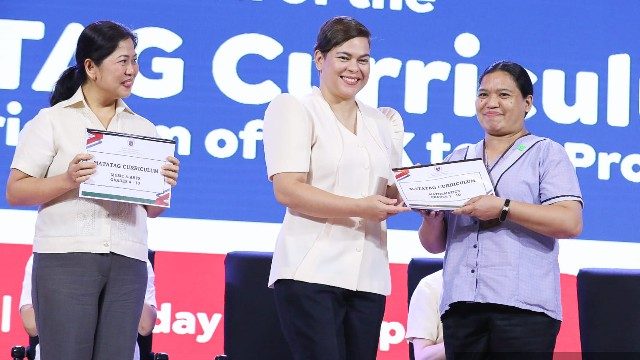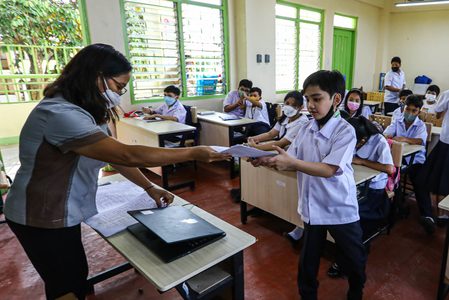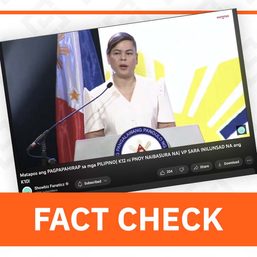SUMMARY
This is AI generated summarization, which may have errors. For context, always refer to the full article.

MANILA, Philippines – The Department of Education launched its ‘Matatag’ revised K-10 curriculum on Thursday, August 10, in Pasay City.
The revised curriculum reduces the number of learning areas for students to focus on foundational skills.
Previously, the K-10 curriculum focused on Filipino, English, Mathematics, Araling Panlipunan (social studies), Mapeh (music, arts, physical education, and health), and Edukasyon sa Pagpapakatao (humanities).
The current foundational subjects focus on five areas:
- Language
- Reading and literacy
- Mathematics
- Makabansa (patriotism)
- Good manners and right conduct
Curriculum Director Jocelyn Andaya said during her speech that they “decongested” the current curriculum by 70%.
Vice President and Education Secretary Sara Duterte said the revised curriculum comes after at least two years of review with local stakeholders, the academe, and international experts.
“One of the issues discovered was that the curriculum was overloaded with too many lessons or subjects. The curriculum required instructors to teach an excessive number of learning competencies—with very limited time available for instruction,” Duterte said.
“Both teachers and learners were overburdened with lessons and other school tasks and activities. The result was devastating for our learners. It compromised their mastery of fundamental skills such as reading and solving simple math problems,” she added.
A 2021 World Bank study revealed that over 90% of Filipino students at the age of 10 struggle to comprehend age-appropriate text.
Duterte said narrowing the focus of both teachers and students would help improve student learning outcomes.
Peace competencies?
Aside from the literacy and numeracy focus, Duterte said the new curriculum will integrate “peace competencies.”
“[The curriculum] highlights non-violent actions and the development of conflict-resolution skills in learners,” Duterte said.
“For after all, there is security, there is peace,” she added.
Earlier in August, Duterte defended the inclusion of a P150 million confidential and intelligence fund, citing similar reasoning, that education and national security are intertwined.
The rollout of the new curriculum will be in phases starting in the 2024-2025 school year.
Kinder, grades 1, 4, and 7 will be the first learners to have the new curriculum.
Followed by grades 2, 5, and 8 in 2025; then 3, 6 and 9 in 2026, and grade 10 by 2027.
By 2028, the DepEd expects full implementation of the new curriculum.
However, select schools will already be a part of the pilot implementation of the curriculum rollout before the 2023-2024 school year ends so that the DepEd would be able to spot issues and improve the actual rollout.
No more mother tongue, resource challenges
While the ‘mother tongue’ subject or a regional language aside from Filipino will be dropped as a subject, it would not be dropped as a medium of instruction, DepEd spokesperson said in a press conference after the curriculum launching.
DepEd Undersecretary Michael Poa clarified during a press conference that the language class, which would replace mother tongue, would focus on general communication skills and would be taught in the language spoken by a majority of students in their area.
DepEd’s Bureau of Alternative Education Director Marilee Alamayda said, however, that they anticipate challenges with training teachers and creating the learning materials.
“There will be initiatives the teaching strand will embark on, teacher training, resources etc… because we actually foresee that this will be some of the major challenges that our teachers in the field will face,” Almayda said.
The DepEd will convene textbook suppliers to create and review the materials that will be used in the new curriculum soon.
Poa said to spot any issues with these materials is also a reason why the DepEd will rollout a pilot implementation first.
“That’s always why curriculum strand will be a part of the pilot implementation,” he said.
The senior high curriculum is also under review, but will be unveiled sometime in 2024. The overall goal of the ‘Matatag’ curriculum is to create students who are employable and globally competitive by the time they graduate 12th grade. – Rappler.com
Add a comment
How does this make you feel?


![[OPINYON] Tungkol sa naging viral na social media conjecture](https://www.rappler.com/tachyon/2024/07/thought-leaders-conjecture-07262024.jpg?resize=257%2C257&crop_strategy=attention)











![[Rappler’s Best] Knowing when to leave](https://www.rappler.com/tachyon/2024/07/biden-sara-gfx.jpg?resize=257%2C257&crop_strategy=attention)
There are no comments yet. Add your comment to start the conversation.